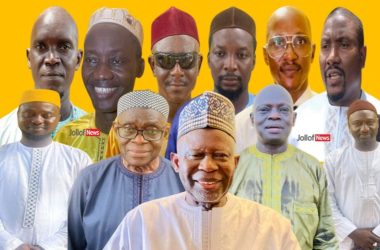 By Gambian Outsider!
By Gambian Outsider!
I dedicate this article, that I am going to have published in two parts, to Mr. Ousainou Mbenga and a brother of mine whom I do not want to mention his name. Why the dedication. Mr. Mbenga does not know this but when I came to the United States more than 25 years ago, I used to attend as many of his group’s meetings as I was able to attend. Those meetings were frequently attended by the likes of Dr. Nyang of Howard University, Mr. Tombong Saidy and others. Yes the same Tombong Saidy, now a businessman in the Gambia. I was a very naïve young man then. I was clueless and was not sure what I really wanted to study. By the way, I am still clueless. There was this small spark within me like most young people have but do not know what to do with.
To borrow the words of Walt Whitman, an American poet, who was inspired by Ralph Waldo Emerson: “I was simmering and simmering and Emerson put me to a boil.” I too was simmering and simmering and Mr. Mbenga and that brother put me to a boil. Mr. Mbenga does not know my true identity and I intend to keep it that way. To Ous and to that brother, thanks for having put me to a boil!
PART THE FIRST
Section 4 of The Gambia Constitution states that, “ This Constitution is the Supreme Law of The Gambia and any other law found to be inconsistent with any provision of this Constitution shall, to extent of the inconsistency, be void. From the authority of Section 4 of the Constitution, I construct the following syllogism:
(i). A law that offends any provision of the Gambia Constitution in whole or in part is unconstitutional to the extent of such offense.
(ii). Section 5(2) of the Public Order Act (POA) offends Section 25(1)(d) of The Gambia Constitution in whole or in part.
(iii). Therefore Section 5(2) of the POA is unconstitutional.
On November 27, 2017, The “New” Supreme “Gambianisation” Court of the Gambia ruled that Section 5 (2) of the Public Order Act (“POA”) is not inconsistent with Section 25(1) (d) of the Gambia Constitution. Section 25 (1)(d) of the Constitution states that: Every person shall have the right to freedom to assemble and demonstrate peaceably without arms. The provision does not say may or might but shall. The word shall in the provision does not mean that the right to freedom of assembly and to demonstrate peaceably is absolute.
The reason the word shall is in the provision is to alert and caution any interpreter of the said provision that, though the right to freedom of assembly and to demonstrate peaceably is not absolute, it cannot be denied without Due Process of Law. Due Process of Law means that an individual’s right to life, liberty, and property shall not be denied without a fair and impartial hearing. The right to freedom of Assembly and to Demonstrate peaceably is a LIBERTY INTEREST.
Not all rights are equal. Restrictions on some rights demand a stricter scrutiny than others. Where a right is recognized as fundamental the test is at its strictest level. That means, the burden is on the party who is denying or restricting the right to show that the law (here Section 5(2) of the Public Order Act) is necessary to achieve a compelling government purpose.
It appears to me and others that The Gambia Supreme Court did not used any standard to the challenge of the constitutionality of section 5(2) of POA. This being the case, we can look at jurisdictions where such standards are well established. Because I am more familiar with how courts in the United States operate, I will use United States federal courts procedures to show what I mean by standard of review. In other words, I am only using United States federal courts procedures to give you a sense of what a standard of review is. I am emphasizing this point in anticipation of those who may make the objection that courts in the United States operate differently from courts in the Gambia.
In the United States, the standard of review requiring government to show that its action is necessary to achieve a compelling government purpose is the most stringent standard of judicial review used by the courts. How strict is this level of scrutiny?
In the United States, seldom does government: federal, state or local satisfies this level of scrutiny. In other words, whenever this level of scrutiny is applied to government action or legislation that restricts fundamental rights, the government action or legislation is often ruled unconstitutional. By upholding section 5(2) of the POA, the Supreme Court is saying that the government’s enforcement of that statute has no available means of achieving its purpose other than how it enforces the statute. Has this government or the former one ever come up with any scheme to try to balance between its interest, “ keeping the peace” and citizens’ constitutional right to assemble and demonstrate peaceably?
If such a scheme is or has been in place, no one seems know what it is. What we call fundamental rights in the United States are what you in The Gambia call entrench clauses. Whether Section 25 (1)(d) is called an entrenched clause or a fundamental right, the standard of review is clear. A clause in a constitutional provision is not designated by the term “entrenched” for nothing. The question remains, what standard of review did the Gambia Supreme Court applied to react its decision in the case?
Section 5 (2) of the POA states: A person who is desirous of forming any public procession shall first make application for a license to the Inspector-General of Police (“IGP”) or Governor of the Region, or other person authorized by the President as the case may be, and if the IGP or the Governor of the region or other person authorized by the President is satisfied that the processions is not likely to cause a breach of the peace, he or she shall issue a license specifying the name of the licensee and defining the conditions on which the procession is permitted to take place.
What in the provision says how the IGP or Governor or other authorized person can be satisfied in order to issue a permit? What guideline does the IGP, Governor, or other authorized person use to determine who qualifies for a permit and who does not? The Supreme Court said absolutely nothing on this issue. The lack of safeguards in the determination of who to grant a permit and who to deny one is the MAIN ISSUE that Section 5(2) of the POA presents.
The entire focus of the Supreme Court in its deliberation as to whether Section 5(2) of the POA offends Section 25(d) should have been whether there exist guidelines in the determination of who to grant a license or who to deny one. If no guidelines exist, the decision is an easy one. On the other hand, if there exist guidelines, the next step is to look into how the guidelines are implemented and whether they are implemented in accordance with established principles of law, i.e., with justice, objectivity and fairness regardless who the applicant may be.
There is nothing wrong in requiring a permit for freedom to assemble. Some commentators in the diaspora have made two conflicting arguments. First, they say that no constitutional right is absolute and I agree with that. Second, they say that Section 5(2) of the POA is unconstitutional because the requirement of a permit to assemble and demonstrate peaceably offends Section 25(d) of the Constitution.
I disagree with this argument. One cannot say that no constitutional right is absolute then also hold that restrictions on a constitution right is unconstitutional. Because no constitutional right is absolute, that is why some restrictions on a constitutional right in not unconstitutional. If restrictions cannot sometimes be applied to constitutional rights then those constitutional rights which no restrictions can be applied are absolute, but it has already be said that no constitutional right is absolute. As you can see, this is an inconsistent argument and therefore a bad one.
My position is that where the application of a permit is required, there must be clear safeguards as to how a permit is to be granted or denied. The defect in Section 5(2) of the POA is not in its wording but in its application. A statute (the POA is a statute) can be unconstitutional is one of two ways: (1), A statute can be unconstitutional on its face. This means that the statute is unconstitutional by the very wording of the statute.

In other words, the very words of the statute infringe on a constitutional right. (2), A statute can be unconstitutional is its execution or application. This means, the wording of the statute is not the problem but how the statute is being executed or applied. The legislature does not necessarily have to give specific guidelines regarding how a statute is to be applied. It can delegate that duty to a government agency and that would be legal.
However, where a duty is delegated to a government agency to act, it cannot fail to act, in this case failed to set safeguards (omission) or set safeguards that are repugnant to a constitutional provision. And where a government agency sets safeguards, it should be clear and fair so that when a person or a group of persons are denied a permit they know why. A government can require a license for speech and assembly only if there is an important reason for licensing and CLEAR CRITERIA leaving almost NO DISCRETION to the licensing authority. Licensing schemes must contain procedural safeguards such as prompt determination of request for licenses and judicial review.
Section 19(1) of the Gambia Constitution is titled Protection of Right to Personal Liberty. This provision can shed much light on the argument I am making about the lack of legitimate procedures in the determination to issue or deny permit under Section 5(2) of the POA. Here is what Section 19(1) of the constitution says about procedural safeguards: Every person shall have the right to liberty and security of person. No one shall be subjected to arbitrary, arrest, or detention. No one shall be deprived of his or her LIBERTY except on such GROUNDS and in ACCORDANCE with such PROCEDURES as are ESTABLISHED BY LAW. I have already point out above that the right to assemble and demonstrate peaceably is a liberty interest.
The “New” Supreme “Gambianisation” Court
In the words of the Supreme Court, quoting a certain Gambian newspaper, “The restriction of the exercise of a right is not an abolition of that right.”[emphasis added]. This is certainly true if the reason(s) for the restriction is clear and legal. If there are safeguards, the Supreme Court is mum on what they are.
The Supreme Court is right that “the requirement for a license is not inconsistent with the Constitution as claimed by the plaintiff.” Even though I did not read the petitioner’s brief, I still agree with the Supreme Court that the requirement for a license is not inconsistent with Section 25(d) of the Constitution.
However, I completely disagree with the Supreme Court’s reasoning where it says that, “The power of the IGP to issue license or deny same does not have any effect on the constitutionality and validity of Section 5 (2) of the POA. The IGP has the power to issue or deny license in so long as the authority that gives the IGP that power is consistent with the Supreme Law of the land. The source of the IGP’s power to issue or deny a permit derives from Section 5(2) of the POA. If the IGP or any authorized person or agency takes action that denies persons a constitutional right it is a duty to look at how and why such persons were denied their right to assemble and demonstrate peaceably. The first step is to see if the power used by the IGP or any authorized person or agency is valid. The second step is to see how that power is exercised.
The power to issue a permit by the IGP or any other authorized person is valid because it is derived from Section 5(2) of the POA. How is that power exercised? This question cannot be accurately answered without first finding out if any guidelines or procedural steps exist and how the IGP or those persons or agencies authorized to use such power actually use it when decisions are made as to who to granted a permit and who to denied one. I urge you to direction your attentions at whether guidelines or procedural steps exist. And if they do, how are the guidelines or safeguards implemented by the IGP or authorized persons or agencies when a decision is made to issue or deny a permit?
The fact of the matter is that whatever those guidelines or procedural steps are, the must be clear and not arbitrary and capricious. I refer you again to the language of Section 19(1) of the Gambia Constitution: “Every person shall have the right to liberty and security of person. No one shall be subjected to arbitrary, arrest, or detention. No one shall be deprived of his or her LIBERTY except on such GROUNDS and in ACCORDANCE with such PROCEDURES as are ESTABLISHED BY LAW.”
The power that Section 5 (2) of the POA delegates to the IGP, Governor of a region or other authorized persons is VAGUE because it sets no objective guidelines as to how the authorized decision makers are to be satisfied when persons apply for a permit to exercise a fundamental constitutional right. Where a constitutional right is at issue, a restriction or limitation of that right must be clear to those whose right will be restricted or limited.
As far I am aware, from what I have read on from the Supreme Court’s ruling on the case, it did not discuss any procedural guidelines that the IGP or other authorized persons rely on when they decide who to issue a permit and who to deny same. Could it be that no procedural guidelines exist? Because procedural safeguards are absent in the text of Section 5(2) of the POA and the authorities designated to issue or deny permits seem to have none, it is therefore a very bad argument and not true for the Supreme Court to say that “… to issue license or deny same does not have any effect on the constitutionality and validity of Section 5(2)” of the POA.
Conclusion
Section 5(2) of the POA is UNCONSTITUTIONAL because it leaves the granting or denial of permit at the DISCRETION of the license issuer without any objective safeguards in the determination of the granting or the denial of a permit.




